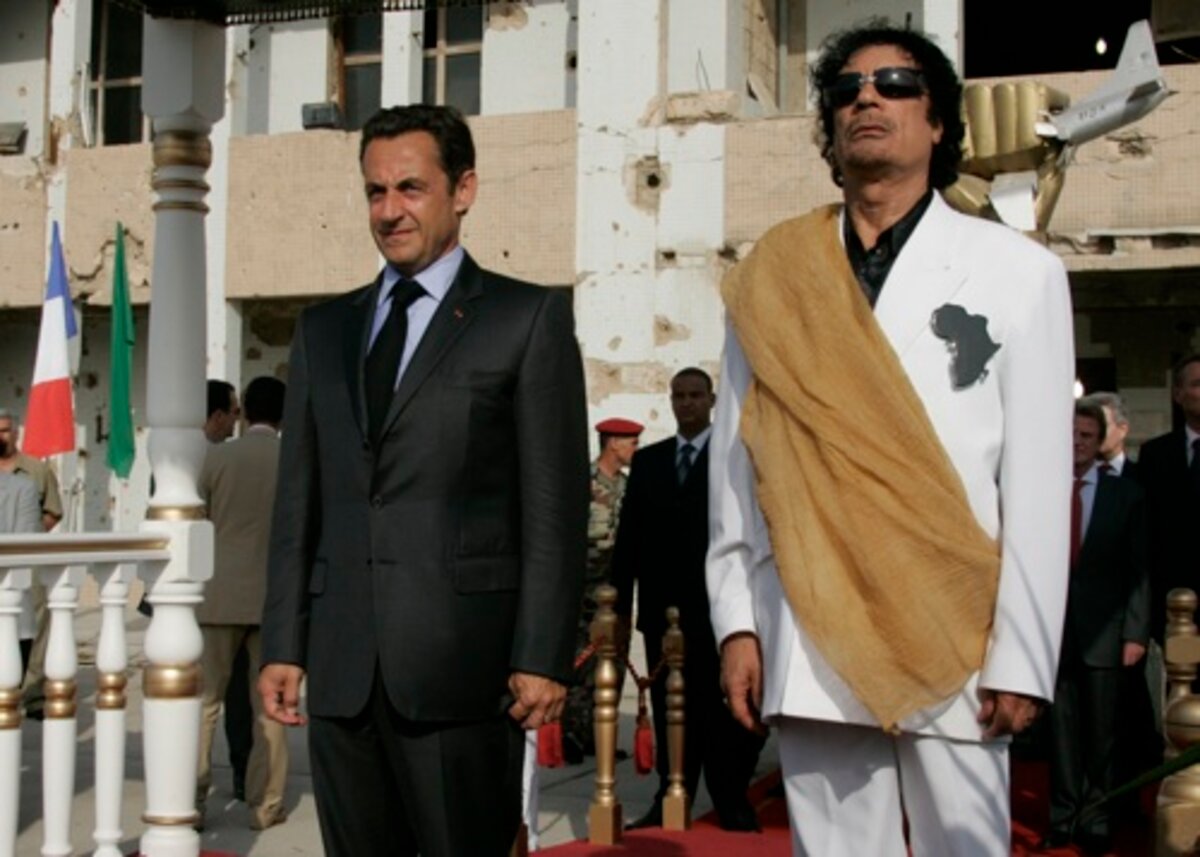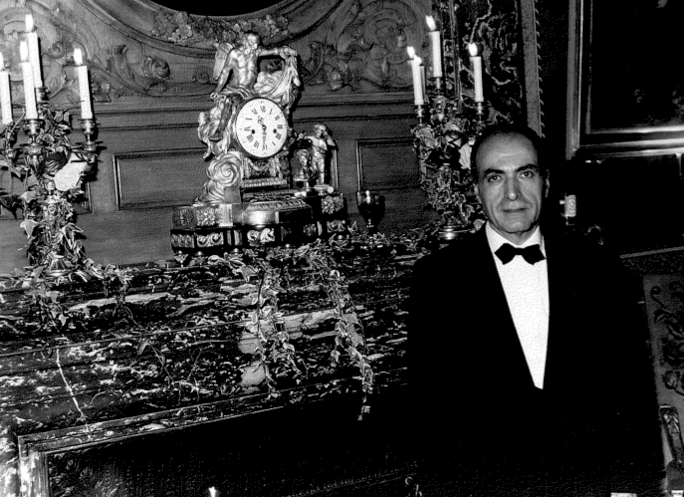Amid continuing speculation over the whereabouts of deposed Libyan leader Muammar Gaddafi, Mediapart has obtained exclusive details of a highly sophisticated ‘stealth' four-wheel drive armoured vehicle sold by France to Libya in 2008 for the dictator's safe transport. The modified Mercedes can "instantaneously detect over 2,000 threats" according to French company Bull which developed the vehicle's security system as part of a controversial weapons and security contract negotiated with Tripoli by President Nicolas Sarkozy's staff. The deal included equipment presented as "an inviolable solution to the Anglo-American espionage system". Fabrice Arfi and Karl Laske report on a deal that may still be ensuring mobile refuge for on-the-run Gaddafi.
-------------------------
In 2008, upon the approval of French President Nicolas Sarkozy, a French company delivered to Tripoli a highly-sophisticated, armoured four-wheel drive vehicle designed to ensure the safe transport of Libyan dictator Muammar Gaddafi.
Mediapart, which has exclusively obtained details of the contract, can reveal here the technical specifications of the modified Mercedes ML SUV (see Scribd box further below), which was sold to the Gaddafi regime for 4 million euros. The 4 x 4 is equipped with a Faraday cage and an electronic jamming system capable of neutralizing all radio communications within 100 metres of the vehicle.
The security system developed for the Gaddafi off-roader is now commercialized by French IT company Bull under the trade name ‘Shadow'. It was engineered by Bull's subsidiary Amesys, formerly called i2e. The company describes it as "an 'intelligent' signal jammer, based on technology that is unique in the world, designed to intercept, jam and neutralize RCIEDs (remote-controlled improvised explosive devices)."

Nicolas Sarkozy had backed negotiations for the sale of the modified Mercedes in 2007 when he was interior minister, as part of a wider weapons and security equipment sale in which his then principle private secretary Claude Guéant, now French interior minister, also played a key role.
In a press release dated March 16th this year, Bull, whose corporate slogan is 'Architect of an Open World', claimed: "With Shadow, Bull has developed and refined a whole new generation of jammers, able to deal with all forms of systems relating to remote-controlled explosives, including the very latest ones such as those using UMTS protocol."
"The 'intelligent' jamming technology at the heart of Shadow optimizes the jammer's capacity for action. Effectively, Shadow adapts its power as a function of the interference waveforms, as well as of the threats it identifies, thanks to its ability to detect and classify them. The system only transmits in the presence of a threat, and automatically reconfigures itself depending on its location - taking account of international frequency allocations."
'Compared with traditional systems, this adaptability considerably reduces operators' and vehicle passengers' exposure [to] radiation; which makes the system especially well suited to intensive use,' Bull claimed.
"Shadow technology processes signals from all the systems used with remote-controlled explosive devices, while also making the most efficient use of the radio spectrum and associated RF power. Shadow can instantaneously detect over 2,000 threats and is geared up to respond extremely effectively to GSM and DECT 'bursts' from mobile and cordless telephones," the release continued.
The company offers also a video demonstration.
An Amesys employee, who asked not to be named, told Mediapart that during the development of the system by the Bull subsidiary, "we could no longer phone from head offices when they were testing the system, the mobile phones didn't work. The car emits like a micro-wave oven towards the exterior. It is best not to get close to it."
According to documents obtained by Mediapart, the sale of the vehicle was part of a wider contract for the sale of sophisticated security equipment to the Tripoli regime, worth 26.5 million euros. Called the Homeland Security Program, it was signed in 2007 by Philippe Vanier, then head of i2e, which has since been renamed Amesys, based in Aix-en-Provence, in southern France. Vannier was last year appointed as the Chairman and CEO of Bull.
As Mediapart has previously revealed, the contract included an encryption system, called Cryptowall, based on i2e's own algorithms, sold to Tripoli for 3 million euros. At the time, the company boasted of its ability to counter-act the covert US-led Echelon global surveillance and communications interception system, an eavesdroping network jointly managed with the UK, Canada, Australia and New Zealand. In its presentation to the Libyan regime, it indicated that "the tapping of mobile phones by Echelon allowed the localization and then the arrest in March 2003 of Khalid Sheikh Mohammed," referring to the capture in 2003 in Pakistan of the man regarded by the US as one of al-Qaeda's senior leaders.
"Our procedures are totally unique and offer an inviolable solution to the Anglo-American espionage system', the document read, adding: "Libya's vital interests will not be spared by the Echelon system."
The same contract also included a system for spying on internet activity, worth 12.5 million euros. On September 1st this year, in response to questions over the deal from the media, Amesys issued a communiqué on its commercial website in which it claimed that the internet surveillance system was "analytical material involving a [small] fraction of existing internet connections". Shortly afterwards, it abruptly closed down its website, which is officially still under "renovation".

Enlargement : Illustration 3

Paris-based arms dealer and intermediary Ziad Takieddine played a key role in the negotiations and in securing the sale, which was managed at a political level by the French interior ministry headed by Nicolas Sarkozy before his election as president. Takieddine worked in very close collaboration on the contract with Claude Guéant, initially when Guéant was Sarkozy's ministerial principle private secretary, and later when Guéant became the newly-elected president's chief-of-staff. Between 2007 and 2008, Amesys (then called i2e) paid Takieddine 4.5 million euros for his services in the negotiations with Libya.
According to Mediapart sources, Philippe Vanier privately confirmed the commission as being for "commercial services" which he allegedly described as having been "legally" paid. However, the payments to Takieddine, which have still not appeared in the company's official accounts, were sent via a network of offshore companies before finally being paid into an account in Takieddine's name with the Al-Ahli international Bank in Beirut. The percentage of the total contract that was paid to Takieddine for "commercial services" is outlawed by the OECD convention against the bribery of foreign public officials in international business transactions, ratified by France in June 2000.
There is doubt that the so-called "Homeland Security" contract received all the required authorizations at French government level before the deal was concluded in 2007. Under French law, the category of the defence equipment concerned by the sale requires direct approval from the prime minister, which itself can only be delivered after a favourable opinion has been granted by an inter-ministerial committee dedicated to assessing weapons sales.
William Bourdon, lawyer for the Paris-based NGO Sherpa, an association set up to combat economic crime, this month lodged an official legal complaint over the contract, specifically targeting its delivery of electronic surveillance equipment to Libya. "To this day, no government authorization allowing the company Amesys to sell the surveillance system [appears] to have been delivered," Bourdin wrote in the lawsuit now delivered to the Paris public prosecutor's office.
To date, neither Bull, Amesys nor the current French government have confirmed or denied whether all the proper authorizations were delivered before the contract was concluded.
-------------------------
For more on this story and Mediapart's exclusive investigations into the political scandal surrounding the activities of arms dealer Ziad Takieddine, click on the links below:
Arms dealer probe brings illegal funding scandal closer to Sarkozy
The secret financier who brings danger to the Sarkozy clan
Sarkozy, the arms dealer, and a secret 350 million-euro commission
The well-connected arms dealer and his tax returns
How Sarkozy aides saved arms dealer from paradise island 'death blow'
Exclusive: how Sarkozy's team sought grace for Gaddafi's murderous henchman
The arms dealer and his Paris party for the glitterati
Exlusive: how President Sarkozy's team dealt with Gaddafi
When Total paid the bill for the Elysée's secret emissary
How French intelligence shields the sarkozy clan's unofficial emissary
Divorce court freezes arms broker's assets
-------------------------


